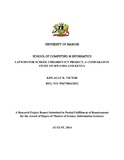| dc.description.abstract | By using a framework based in the field of technology transfer, a comprehensive study of the laptops for school project is presented in this research report. It covers the whole process from early decision making and acquisition to the assimilation and deployment of the technology. The objectives of this study were to compare teachers e-readiness for the implementation of the Laptops project in both countries, compare the Laptops project implementation process and to understand the Laptops project implementation using the ICT transfer model in Rwanda and in Kenya,then recommend a possible framework for future implementations.This study adopted a descriptive design approach. Target population included teachers, officials fromthe ministry of education and other relevant implementation teams in both countries. Data from schools were collected in Rwanda from Muhanga sector just out of Kigali cityand in Kenya fromLangata constituencylocated within Nairobi city. Data was collected using questionnaires, literature study, interviews and observation. Questionnairesin both countries were distributed on a drop and pick method. A pilot study was done before actual data collection in order to establish the reliability and the validity of the questionnaires. The reliably test showed (α=0.798), which exceeded the prescribed threshold of 0.7. Both descriptive statistics and inferential statistics were used in the data analysis. IBM SPSS Statistic softwarev22.0 was used for analyzingquantitative data while qualitative data was analyzed using content analysis. Data was presented by use of tables, figures and narrations. The study findings established that Laptops project implementation in both countries was being executed in phases. The implementation process was more successful in Rwanda than inKenyawith the most important strength in the OLPC project Rwanda being a strong will and commitment of the government to see it through. The study revealed that the existing ICT infrastructure in schools was insufficient however Rwanda is better positioned that Kenya. The study further found out that common challenges are facing both projectswhich included lack of supporting infrastructure such as electricity and internet, insufficient training of teachers, insufficient laptops/computers for learners, and lack of proper ICT policy. The study further noted that the majority of teachers lacked basic ICT skills and that the general skills and knowledge on usage of computers is higher in Kenya than in Rwanda. The study recommends that the Ministries of Education in both countries should consider increasing the training sessions for teachers and make them more frequent as possible. Both governments should take measures to improve the infrastructures in schools such as power supply and internet access. The study further recommends that the project should be incorporated as soon as possible to cover the upper primary levels. A lot of focus needs to go to training teachers on IT skills as a long term measure to a successful project. The issuing of laptops are in phases, hence the researcher recommends that the governmentsshould fast track the issuance from one phase to another to avoid resentment among the children who miss out in the first phases. | en_US |

